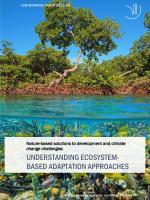Nature-based solutions to development and climate change challenges
Nature-based Solutions (NbS) to climate- and development-related challenges have recently gained attention in development cooperation. Among other, approaches that fall under the NbS umbrella include Ecosystem-based Adaptation (EbA), Ecosystem-based Mitigation (EbM) and Ecosystem-based Disaster Risk Reduction (Eco-DRR). This new DIIS Working Paper focuses on nature-based solutions to climate change adaptation, EbA. It provides an overview of selected lessons learnt from EbA in the context of development cooperation, with a particular emphasis on the opportunities and risks regarding poverty alleviation and rights. It generates learning for Danish development cooperation, including future programming under Denmark’s 2021 development strategy, in which NbS approaches are emphasised. However, the paper can also be read as a general discussion of experiences with EbA in the development context.
The three-legged EbA approach focuses on human well-being, ecosystem management, and climate change adaptation. EbA has already been applied to a range of ecosystems, including the restoration of mangroves to shield them against storm and sea-level rises, the management of watersheds to protect against droughts and flooding, the management of rangelands to inhibit desertification and land degradation, and more sustainably managed fisheries and forestry to tackle food insecurity. EbA thus not only addresses the restoration of already degraded ecosystems, but also the sustainable use, management, and conservation of intact ecosystems.
The paper provides a conceptual overview of EbA in relation to NbS, outlines the potential in using EbA approaches, and describes the landscape of the institutions and agencies that fund, promote and implement EbA. The paper then provides a synthesis of lessons learned from PES and REDD+ schemes that are of relevance to EbA. For instance, it is emphasised that many REDD+ measures have effectively existed as project islands that were not anchored in national or subnational planning and governance mechanisms. As a result, the conservation activities and socioeconomic benefits were often not effectively integrated or scaled up beyond small project sites. If comprehensively implemented, the EbA approach builds on these experiences by insuring full inclusion of stakeholders from all relevant sectors, as well as demanding full integration in existing policies, planning and governance practices from the ministry levels to sub-national governments.
Among the final recommendations and possible entry points for Danish development cooperation, the paper highlights that the support must have a strong focus on ensuring that EbA is pro-poor (i.e. supports poverty alleviation) and rights-based (i.e. supports the rights of local resource users). Experience from EbA and related efforts show that EbA is not automatically pro-poor or supportive of local rights to natural resources and ecosystem services. In particular, there is insufficient attention to and knowledge of rights issues in EbA. Therefore, Danish development cooperation should help lead the way in ensuring that EbA takes a rights-based approach and supports poverty alleviation.
This DIIS Working Paper has received financial support from the Ministry of Foreign Affairs of Denmark. It reflects the views of the authors alone.
DIIS Eksperter


